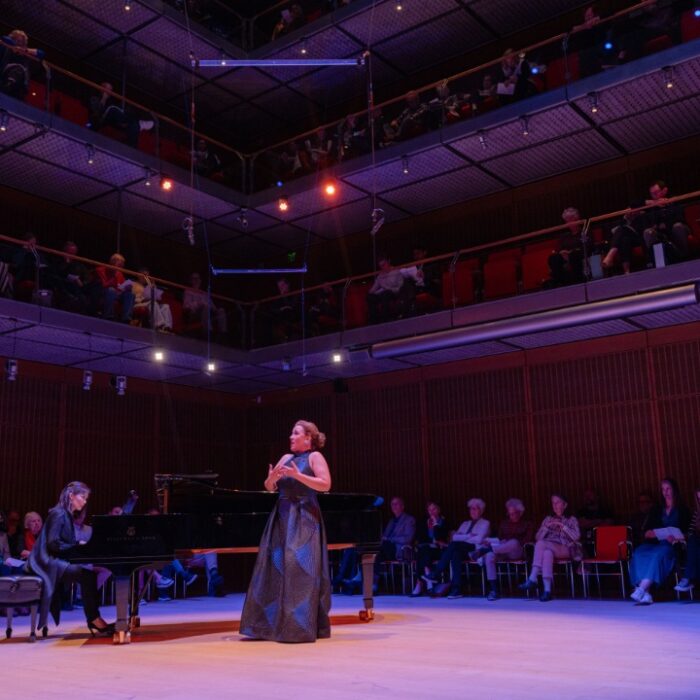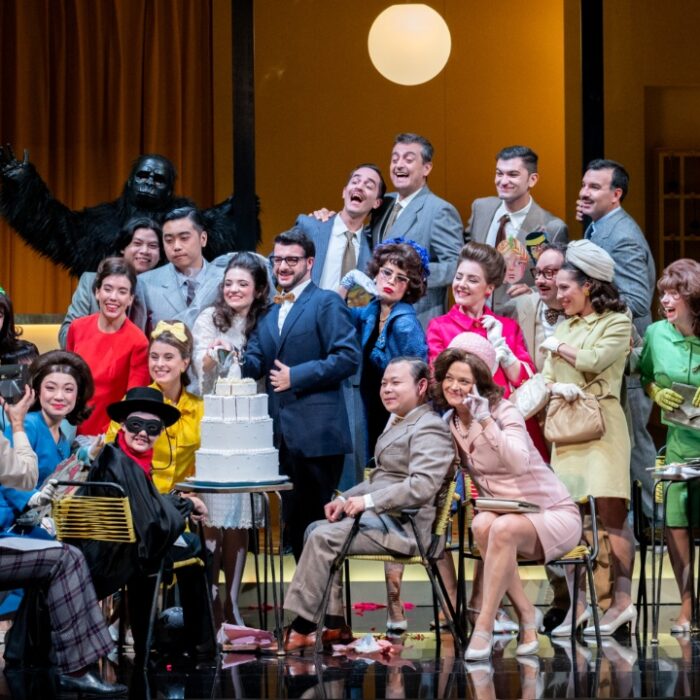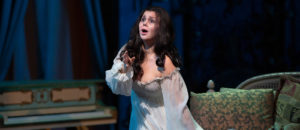
Metropolitan Opera 2019-20 Review: La Traviata
Aleksandra Kurzak Lights Up Michael Mayer’s Increasingly Comotose Production
By Francisco Salazar(Credit: Marty Sohl/ Metropolitan Opera)
On Jan. 10, 2020 Verdi’s “La Traviata” returned to the stage in Michael Mayer’s production.
It was the first revival of the production which scored a divisive reaction from the critics and the audience last season when it premiered. For this revival the Met brought superstar Aleksandra Kurzak, who was taking on the role of Violetta for the first time at the Metropolitan Opera. And she nailed it.
Unfortunately, there wasn’t much to marvel about otherwise.
It Isn’t Better The Second Time Around…
In its first revival since last year, Michael Mayer’s production looked 30-years-older. The sets failed to illuminate and looked dark the entire evening, almost as if they were covered in dust. Interestingly enough the intrusiveness of the production when it opened seemed to fade into the distance. The distracting choreography in Act one was nowhere to be seen as the chorus members stood in their spots throughout the entire evening and costumes in Act one that resembled Beauty and Beast looked dim thanks to the lack of creative lighting choices.
There was, of course, the bed which remains a huge issue and that was most noticeable as supers picked up Kurzak in the first act awkwardly trying to avoid it. In Act two, scene two, the ballet dancers attempted to avoid it causing the choreography to look messy and disjointed. And the choreography continued to be a big distraction as it didn’t match the rhythm of the piece; at times the only thing one heard was stomping on the floor in lieu not Verdi’s incredible music. However, one has to give credit to the two lead dancers for their flexibility and their virtuosic movements.
Other distractions that continued to be detrimental to the viewing experience were Germont’s daughter who was on stage for about two minutes before exiting and Germont’s costume. As designed by Susan Hilferty, there is nothing in the elder Germont’s wardrobe that would indicate he is older than Alfredo; this becomes confusing to the storytelling when you have such a young baritone like Quinn Kelsey in the part. On this evening Kelsey looked like both Kurzak and Dmytro Popov’s brother, making it hard to believe the stakes and circumstances on stage. You shouldn’t have to be constantly working on your suspension of disbelief; great stagecraft is designed to immerse you in the story without making you remember that what you are watching is “fake.”
But overall, the first impression of this production remained the same as last year with the second viewing seemingly a bit more tedious.
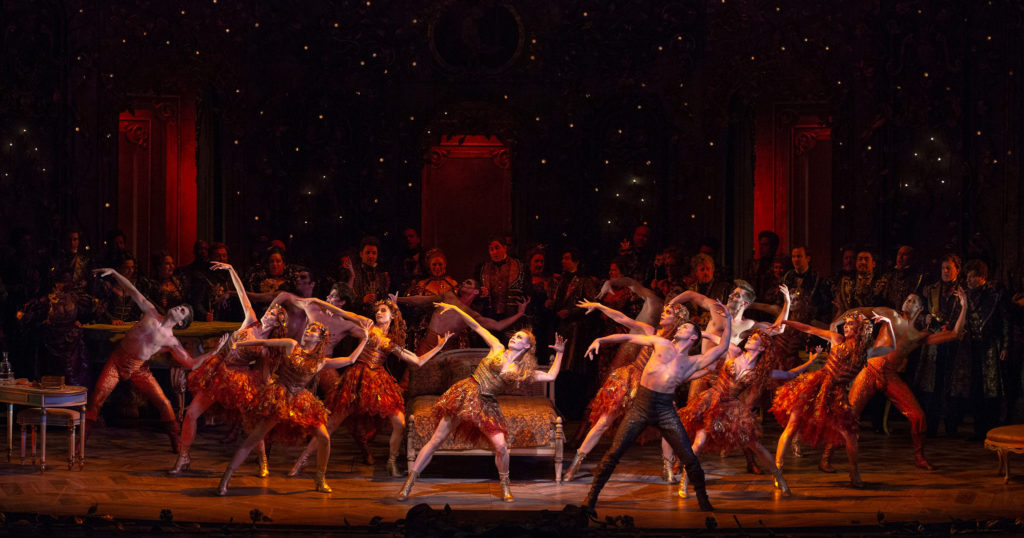
Credit: Mart Sohl/ Metropolitan Opera
A Radiant Star
While this performance was rather uneventful at major moments, it was never the result of Kurzak, who despite playing the dying Violetta, was full of energy and life; she was the lifeblood of this showcase. The Polish soprano was a triumph.
In the first act the soprano ran in with a bright smile and loads of energy. Her singing was filled with vocal fireworks and precise coloratura as well as a lighter timbre that emphasized the jovial aspects of the scene. Physically she was also quite active twirling around the stage and dancing freely. But even so, Kurzak did make it clear from her entrance that this was an ill Violetta, giving the character a slight cough that she ignored quickly.
In her first scenes with Alfredo her interactions were flirtatious, but once she got to the duet, she was overcome with so much emotion. The joy she felt once he left was emphasized in her rendition of “Ah forse lui.” The aria was sung with a fluid legato line that floated with gorgeous sound. Kurzak held out the phrases with precision and connected them with elegance and ardor. One could see that her Violetta had just fallen head over heels for Alfredo.
Yet as she ended the aria and went into the recitative “Follie, follie,” she sang them with assertion and conviction. That was emphasized in her “Sempre Libera” which was a tour de force. When she started the cabaletta she sang the coloratura with brightness as she twirled around the stage with a champagne glass emphasizing, she was a free woman, the text sung with an assertive quality.
But in the repetition after hearing Alfredo, Kurzak’s voice darkened and the voice obtained a weighty quality. That passion returned and while she still sang with precise coloratura, it was clear Kurzak was fighting Alfredo’s call. This time she gave slight accents to the dynamics and text and the “Sempre libera” seemed a bit forced. She threw her glass forcibly and her twirls didn’t seem as organic. One could feel this was a Violetta with conflicting thoughts. Kurzak beautifully conveyed that as she sang this cabaletta with such virtuosic power and topped it off with a rousing E Flat.
That conflicted nature in her singing was on full display throughout Act two. If Act one was about youthfulness, Act two was about dramatic power and rich tone. Her duet with Germont was filled with a wide range of emotional and vocal shifts as Verdi’s music requires. At the start of the duet as Quinn Kelsey sang “Pura siccome un angelo,” Kurzak listened with intent and gave her response “Ah, comprendo dovrò per alcun tempo” with a measured tone. But as the music quickly transitioned to more intensity, her tone grew and her following phrases “Ah, no giammai!” were given a defiant quality. This Violetta seemed to be fighting Germont’s request and unlike most interpretations, Kurzak’s “Non sapete quale affetto” was filled with tension and strength. But in the next musical shift, Kurzak brought out the fear in Violetta, singing with a softer tone; the lines flowed with more passion. Then in “Dite alla giovine – sì bella e pura,” Kurzak lightened her voice and sang with tenderness and heartbreak. One could hear how the lines were reminiscent of a cry for help.
That cry escalated in the “Amami Alfredo.” As Verdi’s music continuously crescendoed in this moment, Kurzak got on her knees and let out her full lyric power, singing the lines with heart-wrenching and raw emotion. If her voice thinned at the top, she made up for it with a creamy middle voice that resonated throughout the auditorium.
It’s hard to talk about the second scene in the act as it is an ensemble scene and no matter how much Violetta does to ignite it, it falls on the tension between Alfredo and Violetta and the surrounding chorus and comprimario roles. Kurzak attempted to show her fear and pain in the Card scene but that tension between them didn’t really read due to the lack of chemistry with Dmytro Popov and the chorus standing upstage, reacting to nothing.
However, her “Pietà di me, gran Dio!” was truly affecting and one did feel that conflict in Violetta as she saw her lover. That lack of chemistry was even more apparent in her subsequent scene with Alfredo.
As Violetta attempted to run from Popov’s Alfredo as he scolded her, one never really seemed to understand it. The one thing that did ring true in this entire scene was Kurzak’s “Ebben l’amo” as she emoted the words with vigor, trying to hurt this Alfredo. And in the concertante Kurzak’s voice rang through the massive ensemble, filling the auditorium. While Kurzak was truly compelling throughout the scene the one thing that did ring false was her Violetta running and throwing herself at Alfredo during the concertante. After seeing such fierce emotions and defiance throughout the evening, this approach just weakened the character and everything that Kurzak had created through the first two scenes. It was yet another of the “original” decisions by the directing team that didn’t work within the context of this story.
In Act three Kurzak continued to transform her voice, obtaining a grittier timbre. It was all about the crudeness of the moment as in this act Verdi gives the soprano many moments to emote which Kurzak relished. One instance came as she read her letter. She began reading with a soft tone that slightly crescendoed and obtained a nervousness that eventually ended in her shouting “È tardi!” with pain and terror. That was followed by a heartbreaking “Addio del passato.” The lines swelled with immaculate breath-control and one sensed that Kurzak was holding each phrase as long as she could. The voice continuously grew and the “Ah, della traviata sorridi al desio” soared with intensity. As the aria ended, the repeated “Tutto” were given slight pauses and staccato phrasing; when she sang the final “finì!,” she held out the note as long as she could, even though it slowly started losing brightness and accuracy of pitch. It was effective nonetheless, a visceral expression of Violetta losing her breath.
It must be noted that during this scene Kurzak’s Violetta seemed to be aware her impending death and consequently unlike most sopranos whose voices glow and brighten in “Parigi o caro” and “ora son forte,” Kurzak chose to maintain that grittiness and darkness in her sound. That was all the more emphasized in the lines “A niuno in terra salvarmi è dato,” which she emoted with potency before going on to sing “Gran Dio! morir sì giovane” with contrasting dynamics; the opening two lines were given an accented forte that was then brought down to a piano. That fear of death became most poignant during these phrases.
Kurzak’s turn was truly compelling and with such commitment one would have wanted the rest of the cast’s performances to be at the same level.
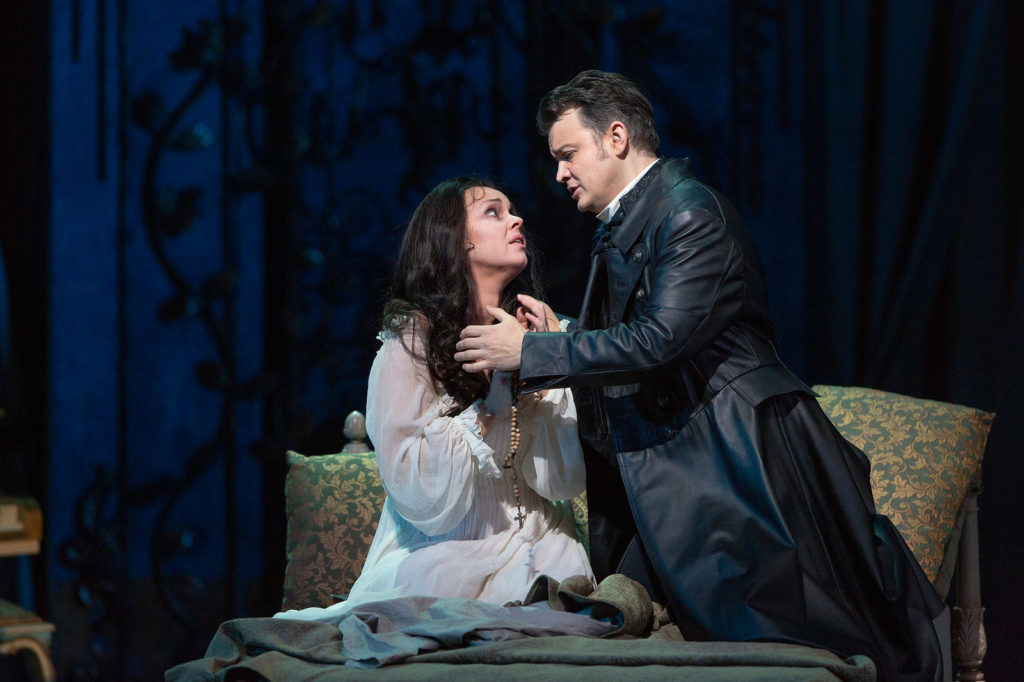
Credit: Marty Sohl/ Metropolitan Opera
Beauty Without Drama
In the role of Alfredo, Dmytro Popov had a mixed evening. The Ukrainian tenor has an elegant dark-hued voice that projects well into the Met auditorium. However, he tended to be stiff on stage, lacking chemistry and passion with his stage partners. In Act one, the duet “Un di Felice” was sung with precision and technical security but it lacked the passion and ardor of an Alfredo just having fallen in love. However, in the cadenza Popov’s voice did ignite with intensity. His demeanor also didn’t help the cause as he seemed reserved and looked like he was following blocking rather than engaging in organic movements. Perhaps he was portraying a timid man. However, that didn’t quite come through.
In Act two, Popov also seemed to be disengaged, often times singing out of tune and once again going through the motions. He did create some captivating phrases in the recitative “Lunge da lei” and phrased splendidly in “Dei Miei Bollenti,” particularly in the cadenza as he sang with an exquisite mezzopiano, the lines melting in his voice with ease. However, in the cabaletta “O Mio Rimorso,” Popov was overpowered by the orchestra with his sound getting muffled and uneven. The only bright spot was his potent and ringing High C.
In Act two, scene two, Alfredo is supposed to lose it and let loose emotionally. However “mi chiamaste? che bramate?,” was sung with finesse. It seemed overly safe, especially given the emotional context of the character. The high notes were bright and accurate, but did not immerse the listener viscerally. That was also evident in his static acting. After he threw money at Violetta, he looked to the audience calmly and as he turned to the chorus and a few chorus members grabbed him, he didn’t appear moved or attempt to let go. It was quite strange and it jarringly took one out of the scene.
Act three didn’t see much change, but it unfortunately did get more awkward. Just like last season as Violetta sings one dramatic line after the next, Popov stood by an ottoman with his head covered. It made for unrealistic staging and only emphasized a weak character with no growth, evolution or care for Violetta as she is dying.
The Supporting Cast
In the role of Germont, Quinn Kelsey reprised his turn from last season. When he premiered the production, Kelsey filled the Met auditorium with his plush baritone. There was also rigidity in his interpretation. Nothing seemed to change on this evening. His voice is large and has an impressive roundness, but throughout the evening his interpretation lacked gravitas. While his aria “Di Provenza” was sung with a gorgeous tone, the line never seemed to gain nuance or even suggest deeper emotional exploration and characterization.
His duet with Kurzak also lacked any type of suspense or drama. While Kurzak attempted to plea with Kelsey, he seemed quite stoic and didn’t react to her raw emotions even when she had intense outcries. The character came off as unsympathetic, something Germont isn’t. Instead the movements seemed to be mechanical. That was most evident in his “Piangi, piangi.” Kelsey sang with a booming sound that undercut the lament that “Dite alla giovane” could be.
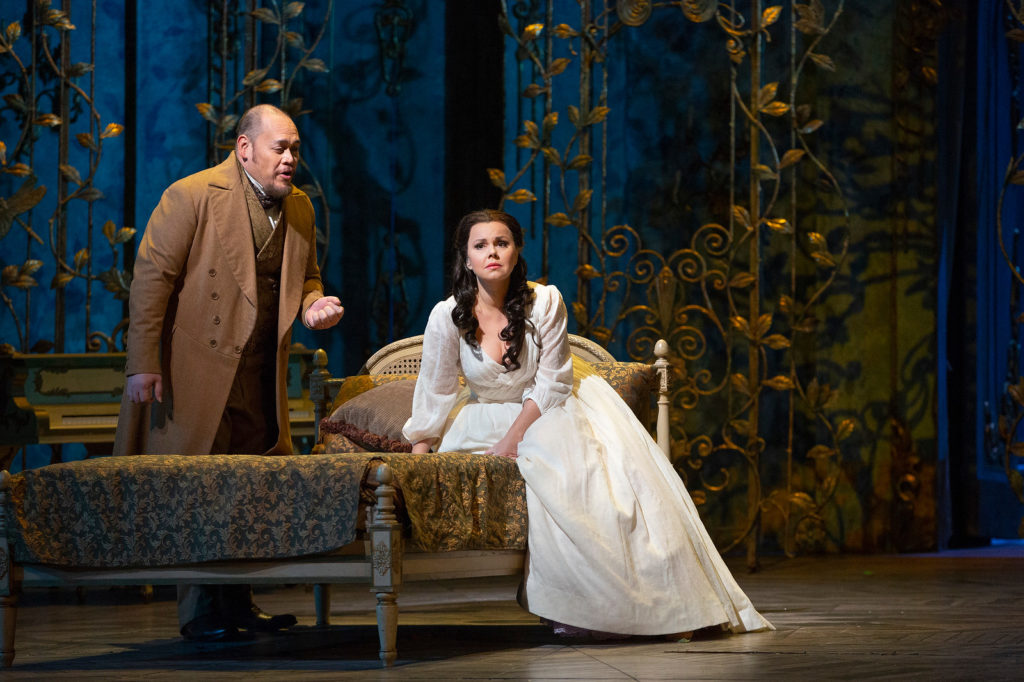
Credit: Marty Sohl/ Metropolitan Opera
More thrilling was Megan Marino’s Flora. She was full of energy and one hoped she had more to do in the opera. Her Flora was defined with seductive power at the beginning of Act two, scene two, but was also at the same time an intermediary who tried to calm the impending conflict. Even in moments where she did not sing, she was engaged in the drama and created a personality for a character that is often lost in the masses.
Christopher Job, Brian Michael Moore, and Maria Zifchak also gave energetic performances that helped lift Kurzak’s stunning interpretation.
In the pit Karel Mark Chichon led a sturdy performance with Verdi’s score, but sometimes receded into the background far too much. It seemed more a proper reading than an incisive one. Chichon did have some great tempi, especially during the card game in Act two, scene two which moved the drama forward and also allowed for dramatic pull. The solos by concertmaster Benjamin Bowman were also exquisitely phrased giving a nice subtlety to the melancholic lines in Act three. The Act three prelude was also delicately textured and it conveyed the tragedy that was about to unfold. Chichon also held out the final notes of the score with such power that it was hard not to feel something as he emphasized the percussion.
There were two things however that disappointed in Chcihon’s reading. The first was the cut of Germont’s cabaletta which made for one of the most awkward transitions of the evening. Throughout the years that cut has been opened, allowing audiences to hear Verdi’s true intentions and on this evening, the composer’s score was let down by a routine cut that should be eliminated from modern standards. On this evening, the orchestra suddenly lost volume before crescendoing back to the dramatic conclusion of the scene.
And then there was the lack of a second verse in “Addio del Passato.” This is of course a soprano call and with Kurzak giving so much raw emotion in the aria, one wished to hear what else she could do with the second verse.
All in all this was Kurzak’s night and she sparkled in it. One hopes that the rest of the cast starts to shine brighter in order to bring to life Mayer’s sloppy production.
